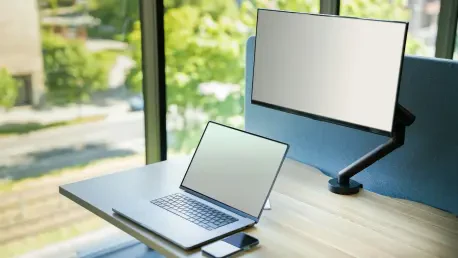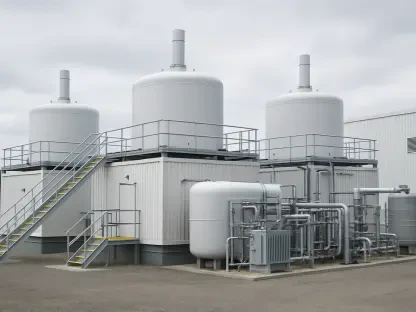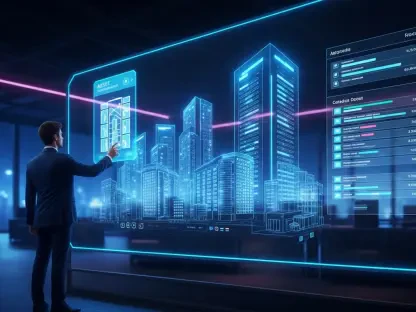In today’s fast-paced world, increasing office productivity is a key focus for many businesses, and the adoption of smart home devices in office environments has emerged as a strategy to achieve this goal. These advanced technologies have the potential to transform workspaces by automating repetitive tasks, streamlining workflows, and creating a more comfortable and efficient work atmosphere. From managing energy consumption to optimizing task management, smart home devices offer a wealth of opportunities for organizations looking to boost productivity and maintain an organized workspace. As more businesses strive to integrate these technologies, understanding how various devices, including smart speakers, lighting solutions, security systems, and more, can enhance office productivity is essential.
Smart Speakers: Your Virtual Office Assistants
Smart speakers have become invaluable assets in office settings by offering a hands-free approach to managing daily tasks. Leveraging the power of voice commands, these devices can streamline operations by scheduling meetings, sending reminders, or setting alerts for deadlines attached to important projects. By syncing with popular productivity apps like Google Calendar and Microsoft To Do, smart speakers simplify task coordination and ensure streamlined collaboration among team members. The ability to access and control other smart devices in the office ecosystem further enhances their utility.
Moreover, smart speakers with built-in capabilities to play music and podcasts serve as a source of motivation, concentration, and distraction minimization. With the ability to adjust volume levels or switch genres on the fly, they become instrumental tools in creating a conducive work environment. The integration of machine learning allows smart speakers to adapt to individual and team preferences, providing tailored suggestions and aligning with the user experience’s evolving expectations.
For businesses, utilizing smart speakers equips employees with the autonomy to manage their workflow efficiently while ensuring that essential administrative tasks do not fall through the cracks. The incorporation of AI-driven capabilities has fundamentally shifted how employees engage with technology in the workplace, fostering a more interactive and responsive environment.
Illuminating Workspaces with Smart Lighting
Proper lighting significantly impacts office productivity, and smart lighting solutions provide an innovative approach to enhancing workspace illumination. By utilizing LED smart bulbs, businesses experience benefits such as reduced energy consumption and customizable settings that allow for adjustments in brightness and color temperature. These features tailor lighting conditions to specific tasks, thus aiding focus and enhancing mood. Employees can transition seamlessly between tasks requiring intense concentration and more relaxed brainstorming sessions with a simple voice command or mobile app control.
Smart lighting systems offer the advantage of automatic scheduling and remote accessibility, enabling users to achieve a balance between productivity and comfort throughout their workday. This capacity for customization extends to the integration with other smart devices, such as thermostats and monitors, culminating in a more synchronized office environment. For instance, adjusting lighting based on natural light levels or during video conferences exemplifies the seamless adaptability that smart lighting systems offer.
Further, businesses can benefit from the increased energy efficiency of LED bulbs, which not only reduce operational costs but also support green initiatives. As offices become more aware of their carbon footprint, integrating smart lighting serves as a responsible step towards sustainability. The emphasis on leveraging smart technology reflects a broader commitment to creating personalized work environments where employees can thrive and concentrate better on their tasks.
Energy Efficiency and Control with Smart Plugs
Smart plugs serve as versatile tools that elevate energy efficiency and add a layer of convenience to the office environment. These small yet powerful devices allow users to control electronic appliances remotely, enabling timely power management. Integrating smart plugs with existing smart home systems ensures connectivity and allows comprehensive control over office devices through smartphones or voice commands. Features like energy monitoring and usage scheduling encourage sustainable energy practices by providing insights into consumption patterns and potential savings.
The utilization of smart plugs in office settings brings several advantages, such as reducing standby power consumption for devices when they are not in use, ultimately lowering electricity bills. Employees can enjoy settings for automated device operation; for instance, turning off printers, coffee makers, or lamps at specified times reduces manual intervention. With such feature integration, smart plugs contribute to a more streamlined approach to monitoring and managing office resources.
Moreover, businesses keen on enhancing their sustainability efforts might find smart plugs an invaluable investment. They promote conscious energy consumption habits and align with broader environmental goals by optimizing how and when devices utilize power. As smart plugs continue to offer compatibility with multiple platforms, their value extends beyond the practical and into the domain of responsible environmental stewardship.
Climate Control with Smart Thermostats
Smart thermostats offer a transformative approach to managing office temperatures through innovative programming and intuitive controls. These devices learn patterns of heating and cooling within the office and adapt over time, optimizing energy use while ensuring a comfortable interior climate. The convenience of remote temperature control ensures that the office remains at an optimal temperature, regardless of external weather conditions.
The ability to integrate smart thermostats with other devices further augments the capacity to maintain comfort and energy efficiency. They can be interconnected with smart lighting solutions and blinds, creating a comprehensive climate control ecosystem that responds to occupancy and variation in daylight. This coordination results in a harmonious office environment conducive to concentration and productivity.
Energy savings remain a pivotal advantage of deploying smart thermostats, as they significantly reduce heating and cooling expenses over time. By minimizing unnecessary usage and offering predictive maintenance alerts, smart thermostats support the establishment of both sustainable practices and a responsive workspace, addressing the needs of modern office environments comprehensively.
Security and Assurance with Smart Systems
As office security becomes paramount, smart security systems represent a forward-thinking solution for remote monitoring and protecting office spaces. These systems provide real-time alerts for unusual activities, keeping both physical assets safe and confidential data secure. With features such as motion detection, integration with smart locks, and app-based control, smart security systems offer seamless protection while also simplifying management efforts.
Innovative technologies within smart security systems include making them app-accessible, allowing businesses to monitor office spaces via smartphones. Instant notifications and video surveillance ensure that organizations have all necessary information readily available in case of any interruptions or security breaches. The ability to integrate with smart lighting and thermostats also adds a layer of protection by simulating presence in vacant offices, further deterring unauthorized activities.
Meanwhile, the adoption of smart security technologies elevates office safety and ensures peace of mind, reinforcing an environment where employees can focus on achieving their goals without distraction. The continued evolution of these systems exemplifies the amalgamation of practicality, security, and advanced technology in creating robust protective measures within the office infrastructure.
Elevating Collaboration with Smart Whiteboards
Smart whiteboards have redefined the standard for collaboration and information sharing in office environments. These innovative tools facilitate dynamic brainstorming sessions and enhance collaborative activities by combining traditional methods with advanced digital capabilities. Features such as real-time sharing, digital note-taking, and cloud storage accessibility empower participants to collaborate on projects seamlessly, regardless of geographic location.
One of the key benefits of using smart whiteboards is their ability to improve efficiency during meetings and creative sessions. Instant access to digital resources and project files allows participants to integrate diverse media forms into discussions, enabling richer content and more engaging participation. By accommodating remote colleagues through virtual collaboration tools, smart whiteboards support continuous teamwork and innovation across geographic barriers.
Further, smart whiteboards facilitate a seamless transition from in-person to hybrid work environments, crucial for maintaining adaptive productivity strategies. The integration of this technology into conference rooms and co-working spaces acknowledges the evolving landscape of work dynamics and demonstrates a commitment to aligning workplace tools with modern collaboration needs.
Brews and Breaks with Smart Coffee Makers
Coffee remains a staple in many office environments, and smart coffee makers offer a contemporary twist to match workplace demands. Designed for convenience, these devices enable scheduling and remote brewing, ensuring that a fresh cup of coffee is always ready when needed. This level of control allows employees to minimize interruptions and maintain focus during the workday.
Smart coffee makers support customization by allowing users to select brew strength and preferences, creating a personalized coffee experience directly from a smartphone. Whether managing an individual beverage routine or catering to an entire office, these devices simplify beverage distribution and contribute to increased office efficiency.
Balancing the need for workplace breaks and productivity, smart coffee makers ensure that the ritual of coffee consumption aligns effortlessly with professional pacing. Furthermore, employing these devices encapsulates the essence of smart technologies in the office, wherein productivity enhancements intertwine with employee satisfaction and preferences.
Connectivity and Efficiency with Smart Monitors
Smart monitors elevate modern workspaces by including features such as built-in webcams for video conferencing, voice-assisted operations, and ergonomic design. These elements collectively enhance user experience and promote seamless interaction with various office systems, integral for productivity-focused setups.
As remote work continues to evolve, the necessity of unified communication tools becomes more evident. Smart monitors enable streamlined virtual collaboration by integrating video call capabilities and compatibility with meeting platforms, offering employees an uninterrupted connection to colleagues and clients. These innovative monitors support a fluid work culture that embraces technological advancements for greater efficiency.
Moreover, smart monitors feature enhanced display quality and adjustable settings that cater to individual comfort and efficiency needs. By combining superior functionality and connectivity, they serve as pivotal components in modern office transformations that prioritize optimized employee interactions and seamless communication.
Organizing the Workspace with Smart Desk Organizers
Maintaining a clutter-free desk is essential for maximizing productivity, and smart desk organizers provide a novel solution to achieve streamlined order. With features like integrated charging ports, cable management systems, and built-in task management displays, these organizers present an all-in-one approach to workspace management.
By enabling employees to charge devices efficiently and handle workspace clutter, smart desk organizers foster an environment conducive to work focus and task prioritization. They align with ergonomic principles by aligning organization and task accessibility simultaneously, accommodating varying organizational styles with integrated management functionalities.
Encouraging personalization and accessibility, smart desk organizers are key to efficient office practices in contemporary tech-driven settings. With a focus on practical design and inherent productivity benefits, these organizers demonstrate the value in blending convenience and modern aesthetics for efficient workspaces.
Breathing Easy with Smart Air Purifiers
Smart air purifiers contribute significantly to maintaining a healthy office environment by removing allergens and pollutants, hence promoting overall well-being. Featuring integrated sensors that monitor air quality in real time, these devices provide valuable insight into an often-overlooked aspect of office ambience.
The ability to adjust settings to ensure optimal air quality further empowers employees to manage their environment proactively, whether reducing office allergens or combating atmospheric pollutants. Smart air purifiers maintain respiratory health as they enhance comfort levels—vital for sustaining productivity throughout the workday.
Combined with integration capabilities with other smart devices, lighting, and climate control, smart air purifiers enhance the movement towards comprehensive, sustainable office environments that prioritize employee health. Their establishment in office infrastructure showcases a commitment to pioneering holistic improvements that drive not just productivity, but a healthier workplace culture.
Revolutionizing Document Management with Smart File Organizers
For organizations aiming to digitize and transform document management, smart file organizers provide a contemporary approach to handling paperwork. The transition to paperless systems optimizes documentation processes, facilitating seamless storage, access, and sharing within teams and departments through cloud integration.
Harnessing automated filing and organizing capabilities, smart file organizers enhance workforce efficiency and collaboration by making data retrieval and distribution straightforward. The digitization of document networks fosters information transparency and enables cross-departmental collaboration with increased ease.
Incorporating smart file organizers into the office aligns with eco-conscious trends by reducing paper usage and waste, marking a shift towards more sustainable practices. The emphasis on efficient document management represents modern offices’ commitment to cultivating productivity through strategic innovation, setting the groundwork for smarter workplace solutions.
Enhancing the Modern Office with Integrated Technology
Effective lighting plays a crucial role in boosting productivity in the workplace, and smart lighting solutions offer an innovative way to improve illumination in offices. Utilizing LED smart bulbs provides numerous advantages, such as decreased energy consumption and adjustable settings for brightness and color temperature. These features allow for tailoring the lighting to suit specific tasks, enhancing focus and improving mood. Employees can easily switch from tasks requiring intense concentration to more relaxed brainstorming sessions using voice commands or a mobile app.
Smart lighting systems also bring the benefit of automatic scheduling and remote access, which helps users balance productivity and comfort throughout the day. This customization extends to integration with other smart devices like thermostats and monitors, creating a more harmonious office environment. For example, adjusting lighting to accommodate natural light or during video conferences showcases the adaptability of smart lighting systems.
Moreover, businesses enjoy the energy efficiency of LED bulbs, which not only cut down operational costs but also align with green initiatives. As offices become more conscious of their carbon footprint, adopting smart lighting is a responsible step towards sustainability. Emphasizing the use of smart technology highlights a broader dedication to developing personalized workspaces where employees can excel and maintain their focus on tasks.









